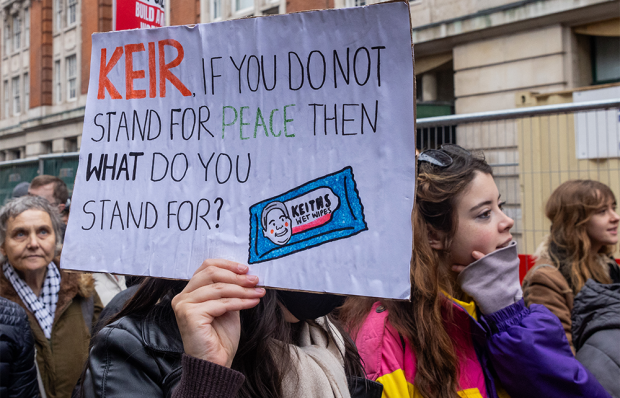Sometimes it’s the little things that depress most. I groaned last week to hear the news item. The government is contemplating a ‘price cap’ on ‘basic items’ in ‘supermarkets’. Forgive the quotation marks, but each of these terms is so horribly problematic that one has to start by asking what they even mean. Has Conservatism in the 2020s lost its ideological moorings?
Or perhaps one should start with a quick recapitulation of the history of this idiotic idea, because price control has been tried before, first by a Labour government, and then by their Tory successors who went on to consolidate the folly. The background to those repeated attempts to limit price increases was raging inflation, government attempts to justify suppressing wage increases and growing public alarm at the cost of living. Remind you of anything?
When Labour came to government in 1964 it had promised a ‘prices and incomes policy’, involving a measure of government control (at first voluntary) of both. In 1965 Harold Wilson set up a board for this purpose. On prices, the board started with an attempt to control the price of soap, bread and road haulage – don’t ask me why. Voluntary agreement failed, so ministers began issuing legal directives, under the direction of the drunkard George Brown.
When Labour lost the 1970 election, Ted Heath scrapped the board only to go even further, appointing the capable Arthur Cockfield to create and run something called the Price Commission, which was beefed up when Labour returned to power in 1974.
At this point my own memories kick in. They are of the likeable Shirley Williams as Labour’s secretary of state for prices and consumer protection, on TV, holding up a basket of what had been designated the basic household products whose price was to be capped. As I recall, the capping was voluntary and depended on retailers’ co-operation. Early reports suggest the present government is thinking along the same lines.
But of course it didn’t work. The then Mrs Williams instituted what I remember as a scheme to incentivise shopkeepers to co-operate. If as a retailer you were respecting the Price Commission’s cap on price increases, you could display in your shop window a big red triangle as a sign to shoppers that the price of those products was being governed by the Commission’s guidelines. There was also (as I recall) provision for retailers wishing to break through the cap on any of the items to go to appeal and justify their proposed price increase to the Commission.
Reader, your logic will have leapt ahead of my prose and the then government’s thinking, to anticipate where this led – and was always going to lead. Participating shopkeepers respected the ceiling on items in the designated basket, displayed the red triangle and – to recoup their consequential losses on the sale of these items – put up the prices of goods not in the basket. I seem to remember a sudden leap in the cost of lightbulbs. Or was it that 60-watt bulbs were covered, but not 40-watt or 100-watt bulbs, so these latter shot up in price? I forget but you get the gist.
No matter. You will at once see that a creeping enlargement of the range of ‘basic’ items was unavoidable if ministers wanted to stop shopkeepers exploiting the loophole at the expense of their customers. And we can end the history lesson here, because when Mrs Thatcher became prime minister she swept away the whole caboodle and charged Cockfield with the much more useful task of setting up the European Single Market.
The moral of this story is that you may by legislation have some limited success in breaking up monopolies and inhibiting the growth of price-fixing cartels, but once you start trying to control prices, item by item, you must either begin slithering down the slope towards a communist state, or (more likely) end up playing whack-a-mole with every price increase that pops up across a vast range of household goods.
Back, then, to those quotation marks as applied to early reports of this latest nonsense. Take ‘price cap’. Is it to be a guide or a hard ceiling? How is it to be varied as wholesale prices to supermarkets go up and down? Won’t wholesalers, manufacturers and farmers (for instance) want a corresponding price floor to what they’re paid by supermarkets, lest the latter try to pass on their losses on capped goods to the ultimate supplier?
And what do we mean by ‘basic’? Hard soap but not moisturising handwash? ‘Artisan’ breads as well as Mother’s Pride? Potatoes but not passion fruit? Clothes? Which clothes? Within days Labour will be spluttering that Rishi Sunak wants the poor to wear cheap slacks and live on cabbage. Finally, ‘supermarkets’: why the report that ministers are talking to the big supermarkets? What about corner shops? Is this a plot to hand a commercial advantage to one or the other?
The bigger question lying behind what may sound like nitpicking is this. Does the present government believe that supermarkets are making excessive profits? If yes, they’d better say so, and explain why a supermarket tax would not be a simpler and more straightforward way of channelling resources to the poor. If no, how do they answer the charge that the whole silly stunt is only really aimed at keeping some prices down by dint of putting others up?
Am I guilty of taking a sledgehammer to a nutty little proposed initiative doomed already to a mayfly summer? Probably. But as someone who has stood for parliament in the Conservative cause, I feel ashamed that the Tories’ intellectual calibre should have sunk so low as even to contemplate this kind of economic illiteracy. I cannot imagine Sunak would be other than contemptuous. In fact I find it hard to imagine he even knew about the proposal before it was run up the flagpole. It will come to nothing. This may be the last you hear of it. Please God, let us hope so.
Got something to add? Join the discussion and comment below.
Get 10 issues for just $10
Subscribe to The Spectator Australia today for the next 10 magazine issues, plus full online access, for just $10.
You might disagree with half of it, but you’ll enjoy reading all of it. Try your first month for free, then just $2 a week for the remainder of your first year.















Comments
Don't miss out
Join the conversation with other Spectator Australia readers. Subscribe to leave a comment.
SUBSCRIBEAlready a subscriber? Log in